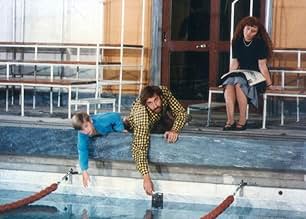VALUTAZIONE IMDb
7,1/10
3281
LA TUA VALUTAZIONE
Durante una partita di pallanuoto, Michele, funzionario del PCI colto da amnesia, rimette insieme i pezzi della propria vita e discute sul disagio, la confusione, le contraddizioni della sin... Leggi tuttoDurante una partita di pallanuoto, Michele, funzionario del PCI colto da amnesia, rimette insieme i pezzi della propria vita e discute sul disagio, la confusione, le contraddizioni della sinistra.Durante una partita di pallanuoto, Michele, funzionario del PCI colto da amnesia, rimette insieme i pezzi della propria vita e discute sul disagio, la confusione, le contraddizioni della sinistra.
- Premi
- 6 vittorie e 15 candidature totali
Recensioni in evidenza
If you are Italian and old enough to have lived there in the 70s/80s, then you will probably get the point of this movie: Moretti's conflictual relationship with the (then) Italian Communist Party. But that doesn't change the fact that the film is weird and delirious.
If your clique is the intellectual/radical/snobbish kind, you'll have to say that the movie is superb.
If none of the above applies, then pick another film.
If your clique is the intellectual/radical/snobbish kind, you'll have to say that the movie is superb.
If none of the above applies, then pick another film.
an exceedingly eccentric film, with a devil-may-care approach that succeeds - and only just, at that - to the extent that one is charmed by wild improvisation. this is my style, so what, says the director, and shall we next try this?
Political analysis is quite beside the point, which is indeed the point, if any, of the film. The absurdity of grasping at political meaning (or rather, replacing it with expression) is wonderfully captured in amnesia (and the entire success of the film, by the way, depends on a brilliantly sustained performance in this role).
babble; terrific fun.
Political analysis is quite beside the point, which is indeed the point, if any, of the film. The absurdity of grasping at political meaning (or rather, replacing it with expression) is wonderfully captured in amnesia (and the entire success of the film, by the way, depends on a brilliantly sustained performance in this role).
babble; terrific fun.
This film is deeply enmeshed in the political culture of Italy, and, in particular, in the culture and politics of that party once known as the Italian Communist Party (PCI). Although you don't need an understanding of this context to enjoy the film, your appreciation of it is certainly enhanced by knowing where Moretti is coming from.
Throughout the film the protagonist, Michele, reiterates a phrase that captures a good deal of the identity of the PCI: `We're the same, but we're different.' The PCI claimed, on the one hand, that it was like any other party: it sought to arrive at power by winning a consensus at the polls and electing its candidates to public office--a party with just as much right as any other (`of equal constitutional dignity') to exercise power within a democratic state. On the other hand, the party said that it was different from all the others because it wanted to use state power in order to bring about a transformation of the existing social and economic order: to build a society in which the exploitativeness, irrationality, all-pervasive commercialism, environmental degradation, and social injustice characteristic of capitalism would be gradually overcome. The party was in the system, but not of the system. This, then, was a party that appealed to the dreams of many idealistic Italians to create a better world to live in (party membership fluctuated between 1.5 and 2 million--and the party saw its percentage of the vote rise in every election for 30 years, cresting in '76 at about 35%).
But as the party got closer to being brought into the government, the tightrope act became more and more tortuous--hence, all of those very contorted "party lines" articulated by Michele in which he attempts to explain why the party should be brought into the government (and why there was nothing to fear from the party), while still holding on to the notion that the party stood for opposition to the existing social order. And that's why another constant refrain in the film is Michele's `I remember': he remembers not only things from his own past, but also a time when the party really seemed to stand for the traditional ideals of the Left.
Now the PCI looks pretty much like any other party, and it no longer even calls itself a party, thus distancing itself from its Marxist-Leninist past: its name today is the unthreatening `Democrats of the Left.' And millions of progressive Italians feel adrift now that they have no party as the repository of their idealism--a sense of desperation expressed beautifully by Michele when he cries out, `Di qualcosa di sinistra' (`Just say something leftist').
By the way, the English title given to the film (`The Red Wood Pigeon') makes absolutely no sense. `Palombella' refers to that shot in water polo we would call a `soft lob' and `rossa' =`red'. So a `palombella rossa' is a `red lob,' symbolizing the kind of soft landing that the PCI sought for its revolutionary program.
Throughout the film the protagonist, Michele, reiterates a phrase that captures a good deal of the identity of the PCI: `We're the same, but we're different.' The PCI claimed, on the one hand, that it was like any other party: it sought to arrive at power by winning a consensus at the polls and electing its candidates to public office--a party with just as much right as any other (`of equal constitutional dignity') to exercise power within a democratic state. On the other hand, the party said that it was different from all the others because it wanted to use state power in order to bring about a transformation of the existing social and economic order: to build a society in which the exploitativeness, irrationality, all-pervasive commercialism, environmental degradation, and social injustice characteristic of capitalism would be gradually overcome. The party was in the system, but not of the system. This, then, was a party that appealed to the dreams of many idealistic Italians to create a better world to live in (party membership fluctuated between 1.5 and 2 million--and the party saw its percentage of the vote rise in every election for 30 years, cresting in '76 at about 35%).
But as the party got closer to being brought into the government, the tightrope act became more and more tortuous--hence, all of those very contorted "party lines" articulated by Michele in which he attempts to explain why the party should be brought into the government (and why there was nothing to fear from the party), while still holding on to the notion that the party stood for opposition to the existing social order. And that's why another constant refrain in the film is Michele's `I remember': he remembers not only things from his own past, but also a time when the party really seemed to stand for the traditional ideals of the Left.
Now the PCI looks pretty much like any other party, and it no longer even calls itself a party, thus distancing itself from its Marxist-Leninist past: its name today is the unthreatening `Democrats of the Left.' And millions of progressive Italians feel adrift now that they have no party as the repository of their idealism--a sense of desperation expressed beautifully by Michele when he cries out, `Di qualcosa di sinistra' (`Just say something leftist').
By the way, the English title given to the film (`The Red Wood Pigeon') makes absolutely no sense. `Palombella' refers to that shot in water polo we would call a `soft lob' and `rossa' =`red'. So a `palombella rossa' is a `red lob,' symbolizing the kind of soft landing that the PCI sought for its revolutionary program.
1989: Berlin wall is down. communist dictators in the past. for all the people that lived this age a new freedom, but for those who were in the west, it's the falling of hope. unless everybody knew that real socialism was a bad solution, it represented the chance to create, or just imagine, something different from capitalism. now the wall is down, what does it mean to be left-wing? if you've been a communist all of your life, what's your new position in society. Moretti here represents perfectly this situation: Italian communist party, is almost lost, a great discussion inside: what are we doing, where do we come from, and (most important) where do we go now? are we different, are we the same of the rest? can we find back the will to fight?
I think Palombella Rossa is the best movie of Nanni Moretti (but I am afraid that non-italians people may not think the same, because there are several references to the situation of Italy, both in the 70's and at the time of the movie, that is 1989).
I also think that it is easy to like Moretti (and his movies) very much or dislike him (and his movies) very much. It is much more difficult to stay in the middle.
I personally find in this movie a wonderful mix of humour, fun and poetry. I also appreciate a lot the choice of music and songs and the images from Doctor Zivago (which is immortal, in my opinion).
I think people who liked Moretti movies like April, Son's room and Dear Diary should see this one as well, and I hope they will enjoy it.
I also think that it is easy to like Moretti (and his movies) very much or dislike him (and his movies) very much. It is much more difficult to stay in the middle.
I personally find in this movie a wonderful mix of humour, fun and poetry. I also appreciate a lot the choice of music and songs and the images from Doctor Zivago (which is immortal, in my opinion).
I think people who liked Moretti movies like April, Son's room and Dear Diary should see this one as well, and I hope they will enjoy it.
Lo sapevi?
- QuizThe meaning of "palombella" in Italian includes "columbine", "wild pigeon", and (in water polo, or in other ball sports) "a parabolic shot to go over the goalkeeper and score a goal"/"a lob shot". So the original title of the film could be read as "Red Lob", which brings the sport and the politics -red obviously signifies the Communist Party- together.
- ConnessioniEdited from La sconfitta (1973)
- Colonne sonoreE ti vengo a cercare
(1988)
Written by Franco Battiato
Performed by various characters
Courtesy of EMI Music Italy Spa
I più visti
Accedi per valutare e creare un elenco di titoli salvati per ottenere consigli personalizzati
- How long is Red Wood Pigeon?Powered by Alexa
Dettagli
Contribuisci a questa pagina
Suggerisci una modifica o aggiungi i contenuti mancanti

























